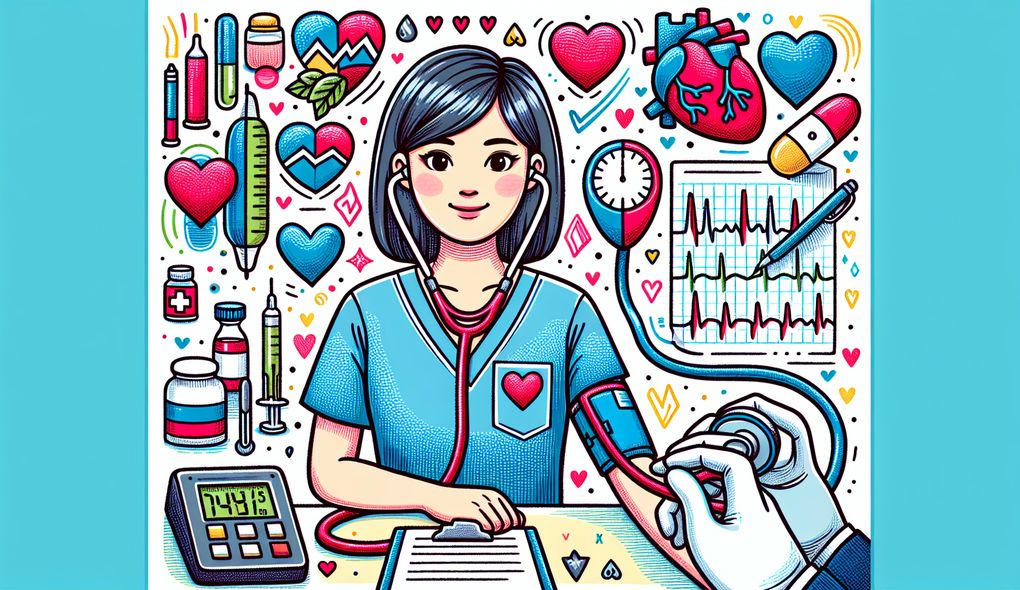What are the key diagnostic tests you order, perform, and interpret for cardiovascular patients? Can you explain how you use the results to inform treatment planning?
SENIOR LEVEL

Sample answer to the question:
As a Cardiovascular Nurse Practitioner, some of the key diagnostic tests I order, perform, and interpret for cardiovascular patients include electrocardiograms (EKGs), echocardiograms, and stress tests. These tests help me assess the function and structure of the heart, as well as identify any abnormalities or potential cardiovascular conditions. Once I have the results, I use them to inform treatment planning by collaborating with cardiologists and other healthcare professionals to develop personalized treatment plans for my patients. The results guide us in prescribing appropriate medications, therapies, and lifestyle modifications to effectively manage and treat their cardiac conditions.
Here is a more solid answer:
As a highly experienced Cardiovascular Nurse Practitioner, I have a comprehensive understanding of the key diagnostic tests for cardiovascular patients. Some of the tests I regularly order, perform, and interpret include electrocardiograms (EKGs), echocardiograms, stress tests, and cardiac catheterization. These tests allow me to assess the electrical activity, structural integrity, and blood flow in the heart. For example, an abnormal EKG may indicate arrhythmias or ischemia, while an abnormal echocardiogram can reveal valvular disorders or heart failure. When interpreting these results, I carefully analyze the findings, compare them to the patient's symptoms and medical history, and collaborate with cardiologists to make accurate diagnoses. This diagnostic process informs the development of treatment plans tailored to each patient's specific needs. For instance, if an EKG shows signs of arrhythmia, I may prescribe anti-arrhythmic medications or recommend a pacemaker. If an echocardiogram uncovers severe mitral valve stenosis, I might refer the patient for surgical intervention. In addition to medications and procedures, I also emphasize the importance of lifestyle modifications, such as diet and exercise, to optimize cardiovascular health and reduce the risk of future complications.
Why is this a more solid answer?
The solid answer expands on the basic answer by providing specific examples of the key diagnostic tests and explaining how the candidate uses the results to inform treatment planning. The candidate demonstrates a comprehensive understanding of the tests and their significance in cardiovascular care. However, the answer could be further improved by showcasing more skills related to the job description, such as strong diagnostic reasoning and treatment planning abilities.
An example of a exceptional answer:
As a highly skilled Cardiovascular Nurse Practitioner, my extensive experience and expertise enable me to order, perform, and interpret a wide range of diagnostic tests for cardiovascular patients. In addition to the commonly used tests such as EKGs, echocardiograms, and stress tests, I am proficient in more advanced techniques such as nuclear imaging, cardiac MRI, and CT angiography. These tests provide detailed information about cardiac function and structure, including myocardial perfusion, scar tissue, and coronary artery disease. When interpreting the results, I utilize my strong diagnostic reasoning skills to analyze complex data, identify patterns, and make accurate diagnoses. This information is vital for developing tailored treatment plans. For example, if a nuclear stress test reveals compromised blood flow in a specific coronary artery, I can refer the patient for a coronary angiogram to determine the need for revascularization procedures. To inform treatment planning beyond medications and procedures, I collaborate extensively with patients, assessing their lifestyle habits, psychosocial factors, and preferences. This holistic approach allows for comprehensive and patient-centered care. I educate patients on the significance of the test results, the rationale behind treatment choices, and the importance of adherence to prescribed therapies. By empowering patients with knowledge, I inspire them to actively participate in their own care and make informed decisions to improve their cardiovascular health.
Why is this an exceptional answer?
The exceptional answer surpasses the solid answer by showcasing the candidate's advanced skills and expertise in ordering, performing, and interpreting diagnostic tests for cardiovascular patients. They demonstrate a broader range of specialized tests and advanced techniques, such as nuclear imaging and cardiac MRI, and emphasize the role of strong diagnostic reasoning skills in making accurate diagnoses. The candidate also highlights the importance of a holistic approach to treatment planning, considering lifestyle factors and patient preferences. To further enhance the answer, the candidate could provide specific examples of how they have utilized their diagnostic skills and results to inform treatment plans in their previous experience.
How to prepare for this question:
- Familiarize yourself with a wide range of diagnostic tests and their applications in cardiovascular care.
- Stay updated with the latest advancements in diagnostic techniques and technologies.
- Develop strong diagnostic reasoning skills by practicing case studies and analyzing complex patient scenarios.
- Enhance your understanding of treatment planning by studying evidence-based guidelines and therapeutic interventions for various cardiac conditions.
- Improve your communication skills to effectively educate patients about their diagnostic results and treatment options.
What are interviewers evaluating with this question?
- Clinical skills in cardiology care
- Diagnostic reasoning and treatment planning abilities

